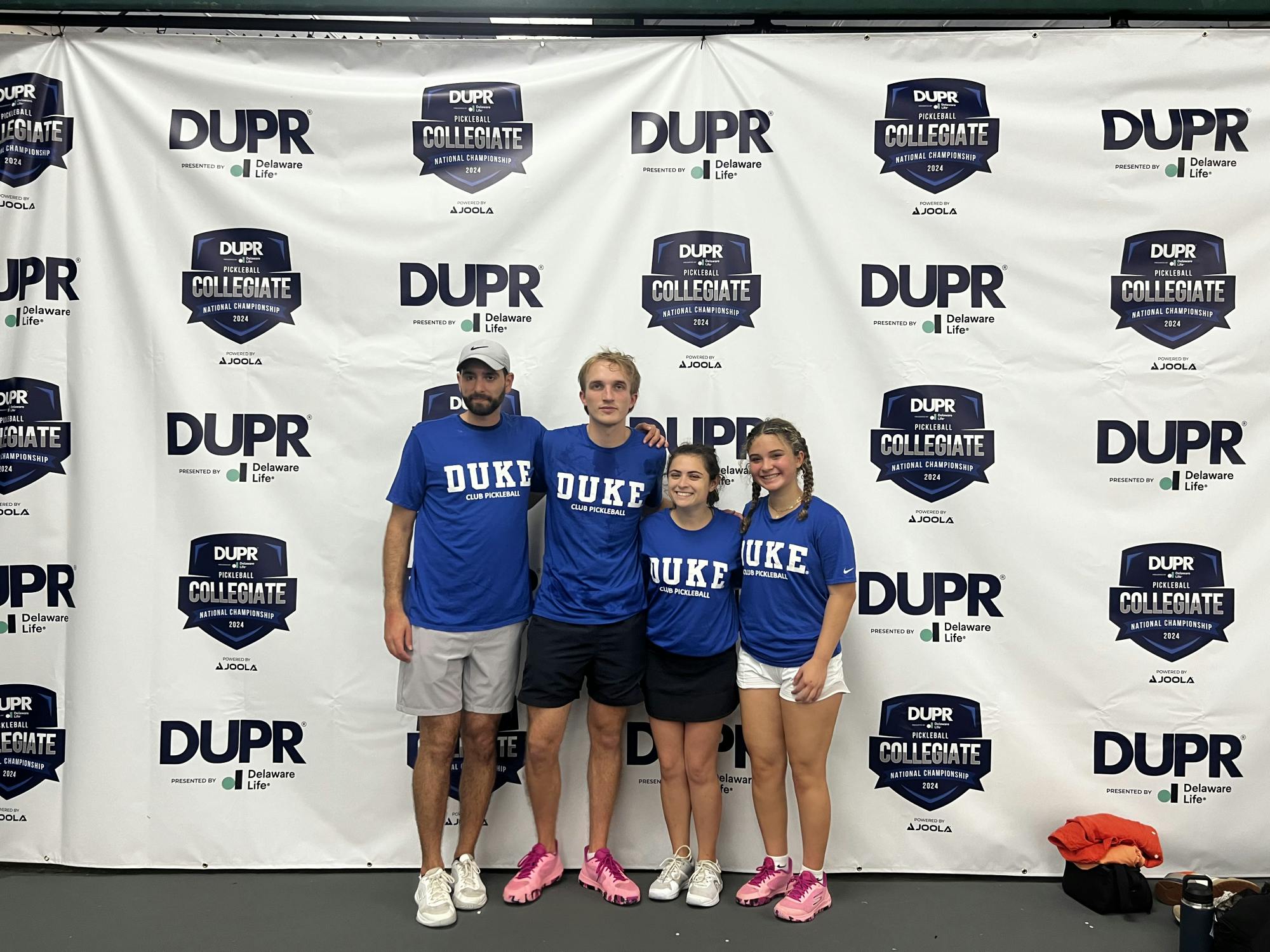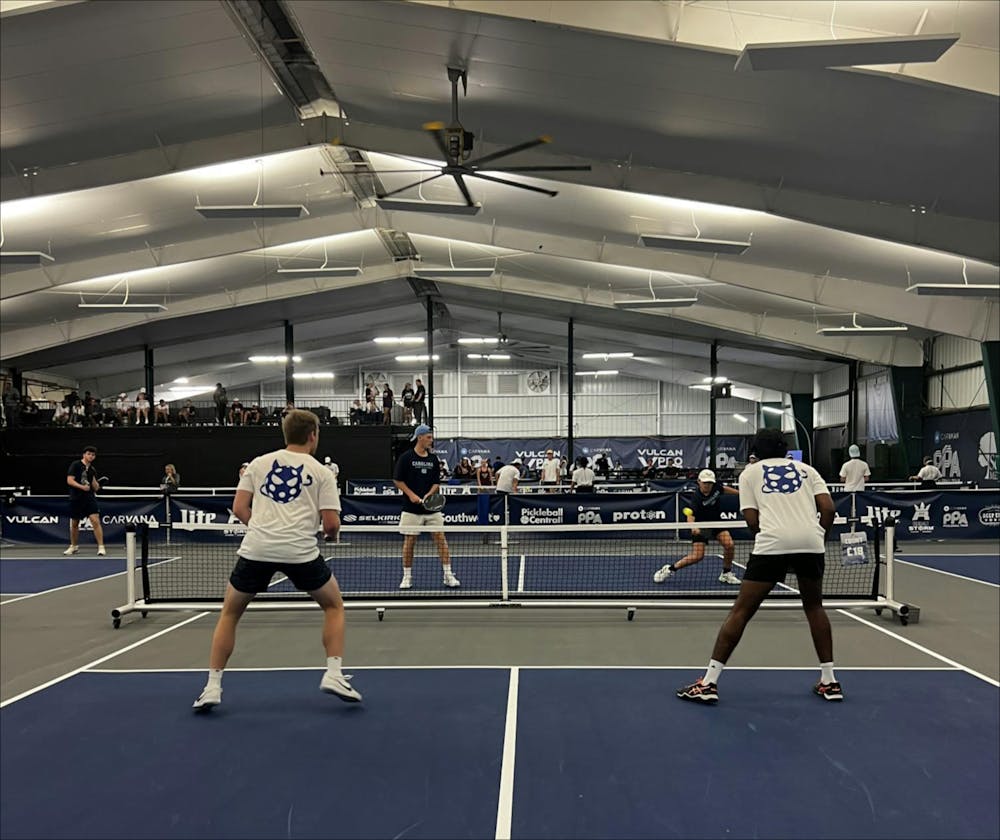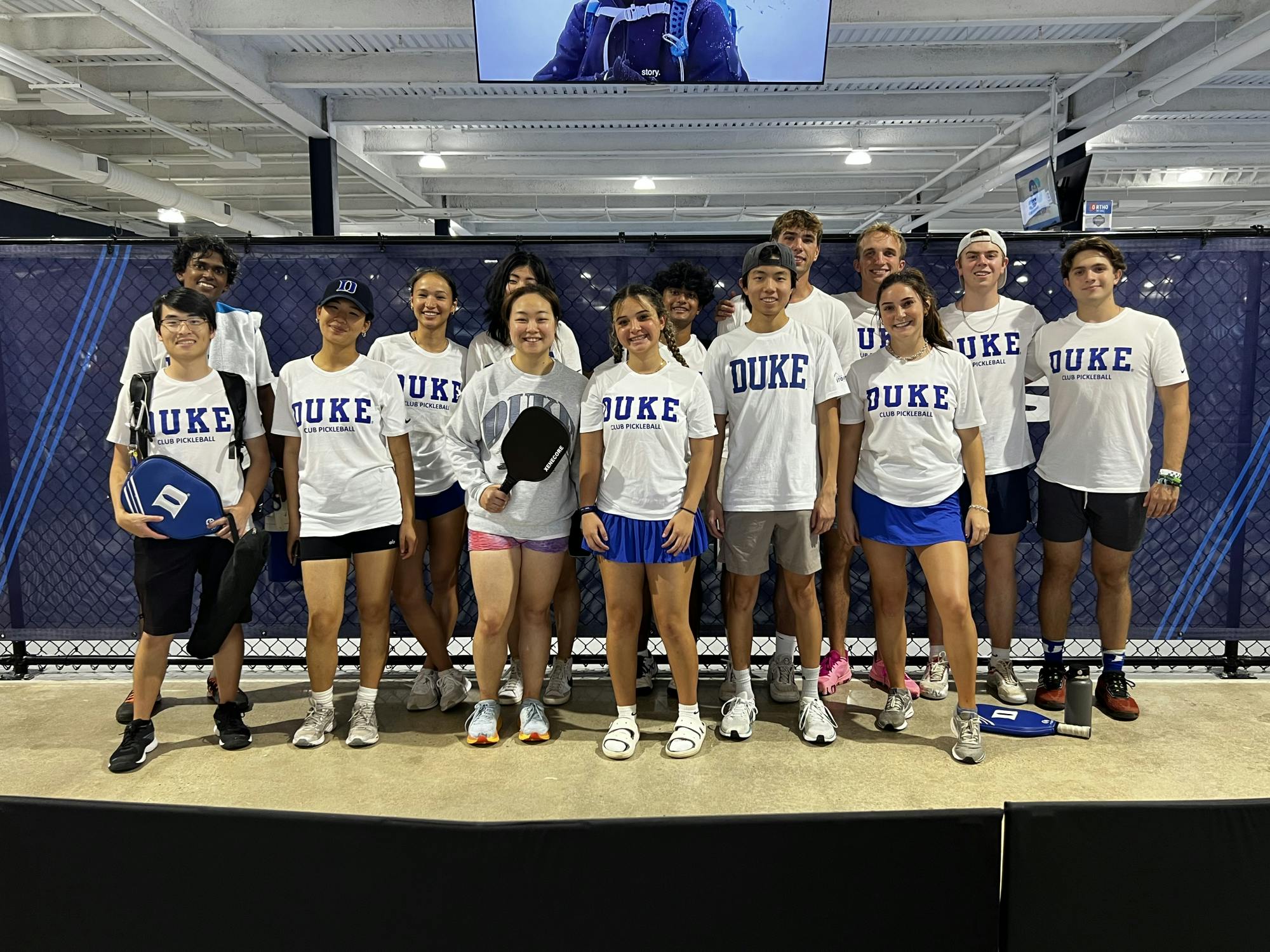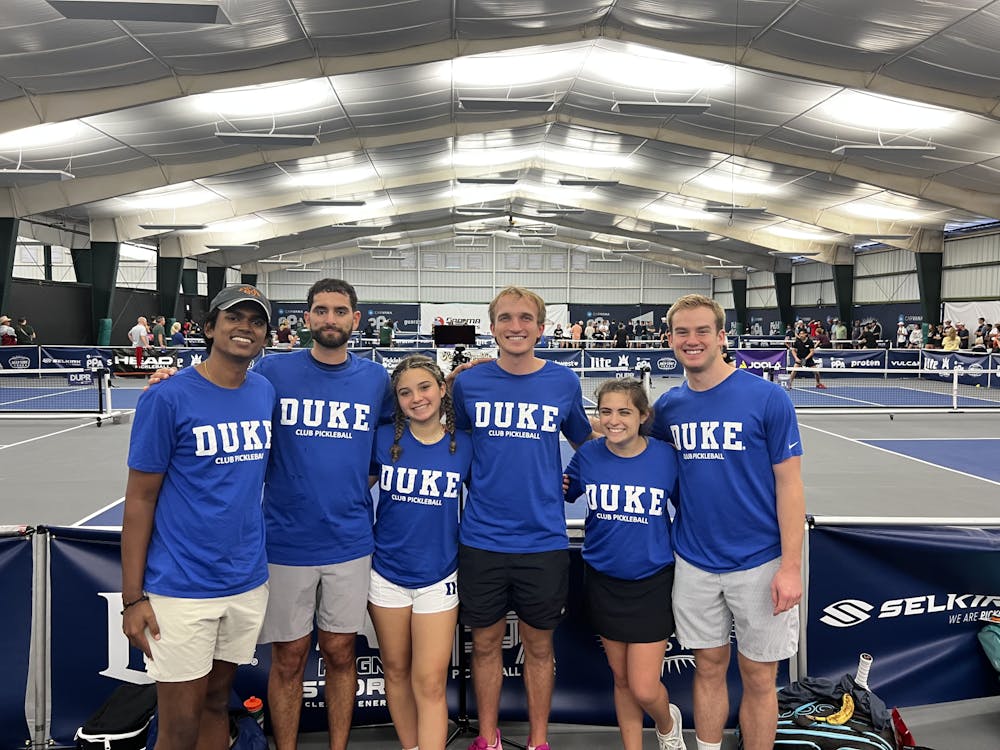After falling behind in the first five rounds of play, it seemed impossible that Duke club pickleball would be invited back for quarterfinals the following day. Assuming that nationals were off the table, two of the four members of Duke’s top pickleball team left Virginia, where the team had been competing in the DUPR Collegiate Virginia Beach Super Regional all day.
But it wasn’t over yet.
Later that night — Sept. 28 — the team received unexpected news from the tournament manager. Because four of the top-performing teams at the tournament had already earned nationals bids earlier in the year, more were up for grabs, meaning that Duke had another shot.
“I couldn’t believe it,” freshman club member Mark DeMonte told The Chronicle. “We didn’t expect to play again, especially not with a bid on the table.”
Newcomers Lauren Mock and Jack Pestana stepped up to fill the missing slots on Duke 1. The remodeled team went 2-2 in their matchups that day, meaning they had to play an extra game to win a bid: the dreambreaker round.
A dreambreaker occurs in pickleball when two teams competing for a bid have the same tournament record. In a dreambreaker, each team’s four members play singles for four rally rotations. This process continues until one team has 21 points and wins by two.
At 20-16, Mock stepped onto the court for her rotation, matched against Randolf-Macon’s best player. Duke only needed one more point to secure its unexpected ticket to nationals. Following a strong serve, Mock nailed it just inside the court, winning the final point in the dreambreaker.
“I didn’t even process what had happened until my teammates started cheering and ran onto the court,” recalled the sophomore. “It was a fantastic moment, and I’m so glad to be a part of it!”
From PE to pro
The idea for a club pickleball team started just under three years ago when professor Janis Hampton noticed the sport’s rising popularity amongst students. Throughout the spring of 2021, she scoured her P.E. tennis class and the East Campus courts for interested players, eventually generating enough interest to jump-start the club during the 2022 spring semester.
Considering that Duke boasts hundreds of student organizations, this may seem like an ordinary feat. However, the team started by Hampton is much more than the traditional club concept.
“There is no NCAA-certified version of this sport yet,” said Katherine Ciro, vice president of the club. “So we are essentially the representation of Duke University in the national collegiate pickleball scene.”
Breaking dreams
On Sept. 27, 12 representatives from the team headed north for the Super Regional. The Duke 1 team, competing in the Top 16 bracket, had a shot at a $1,000 scholarship as well as one of four bids for the national championship in November. The best four teams in the bracket would take those bids, provided they had not already qualified for nationals — in which case it would go to the next-place team.
Duke club pickleball was yet to claim a bid for this season, and only had one team in the top 16 bracket, giving them one shot at the national competition in Dallas.
Unfortunately for them, Duke’s top team did not get off to a great start.
But when Mock won that dreambreaker, the team realized how far it had come and the impact it could have on the club’s future.
“In that moment, I saw the joy, pride and excitement for the future of our team,” Ciro said. “We had worked so hard, and in that single point, it felt like we had achieved something truly special together. It wasn’t just a win, it was the realization of our shared goal.”
Duke was now one of 64 teams bound for Dallas Nov. 3, with the chance to compete in a bracket-style tournament with colleges throughout the nation.
Devils in Dallas
On Thursday, Oct. 31, six Duke pickleball members traveled to Dallas for their shot at national recognition and prize money upwards of $15,000.
The team spent their Friday in group play, a series of non-elimination games that determined seeding for the single-elimination bracket Saturday and Sunday. Duke was ranked 12th going into bracket play, and faced off against N.C. State, the No. 5 seed.
Duke fell in the first round of bracket play, and the Wolfpack went on to defeat fourth-ranked Miami and ninth-ranked Drury before falling to Virginia in the quarterfinals. But even an early loss didn’t diminish the Blue Devils’ shared love for the sport.
“You don’t get that feeling anywhere else at Duke. You don’t have a blast getting a bad grade, from doing poorly on a presentation,” Ciro said. “That’s just unique to our sport and it shows the passion that we have for the game.”
Cost of the game
Due to funding challenges, Duke pickleball is an official club, but not a registered club sport — from the University’s perspective, there’s a distinction. In prior years, the team remained as a “regular” club, as this allowed them to take advantage of significant funding from the Duke Student Organization & Programming Finance team, which paid for tournaments in California, Georgia and Virginia. However, despite the “sizable increase in students interested in playing at tournaments” according to club president Daniel Shih, the group was only funded for one tournament this semester, forcing them to look for new solutions.
Now, Ciro is in the process of applying for club pickleball to be an official club sport starting in the spring. Beyond charging dues, the team has thought outside of the box for other funding opportunities. For nationals in Dallas, Ciro raised $400 through a GoFundMe page, with donations coming in from friends and families of the players. She also hopes to find Duke alumni who are interested in supporting the club’s growth.
“Alumni support would make all the difference,” she said. “We were lucky to make it to nationals this fall with funding being the way it was.”
Ciro and teammate Owen Jensen both became sponsored players after Brandon Lugay, the athlete coordinator of Gearbox Sports (a pickleball company) was impressed by their play in San Diego last spring. Gearbox now sends them paddles, bags, grips and other merchandise that helps ease the expense of playing the sport.
“Pickleball can be an expensive sport,” Pestana said. “Beyond the tournaments, there's the paddles, grips and more that really adds up. I hope to get the chance to be sponsored the way Katherine and Owen are.”

Rallying for recognition
As pickleball continues to surge in popularity across the United States, its presence on college campuses is becoming more pronounced. There are now over 145 collegiate pickleball clubs recognized by USA Pickleball, allowing students to engage in both recreational play and competitive matches against other schools.
The governance of collegiate pickleball is primarily overseen by organizations like Dynamic Universal Pickleball Rating (DUPR) and the National Collegiate Pickleball Association (NCPA). DUPR has emerged as the leading governing body, hosting 14 tournaments across the country in 2023. The NCPA, which was founded in 2023, aims to promote and organize collegiate competitions, hosting regional events with a total prize pool of $25,000. These competitions highlight the growing organizational structure within college pickleball, providing players with opportunities to compete at a higher level, even in the absence of NCAA sanctions.
“I believe this season will be one of the best in the club's history, and I have no doubt that we will continue to grow stronger and more competitive in the coming years,” Ciro said. “As we continue to gain experience and refine our approach, I believe we are on the path to becoming one of the top collegiate pickleball teams in the country.”

Get The Chronicle straight to your inbox
Signup for our weekly newsletter. Cancel at any time.

